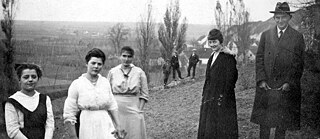Franz Kafka A literary land surveyor?

Franz Kafka – in the capacity of civil servant and patient, author and human being – was certainly well aware of the diverse aspects of rural living. His works are absolutely overflowing with images and stories from village and country life. But what can be deduced from them, and what is their relationship with contemporary thinking and the modern world as it rapidly gathers pace?
Rural idylls?
It’s fair to say that the different – and in modern times increasingly differentiated – aspects of rural life were familiar to Kafka from personal experience: the development of rural spaces for the tourist sector as well as for tech and industry uses, and on the other hand remote farms sustained through sheer graft. And then Prague, which many people in those days still saw as a province, certainly had a definite rural character about it; the mere fact that former country-dwellers had relocated to the town in their droves ensured that rural experiences became part of society there. Kafka’s novels tell these stories too, stories of the countryside within the town, each in their own unique way. You only have to think about the famous “Man from the country” in Vor dem Gesetz (Before the Law) or the uncle in Der Process (The Trial), who appears here quite explicitly as the “ghost from the country”.Kafka was familiar with the heterogeneous nature of the countryside, partly from his own trips and holidays, his summer retreats and health resort visits – but also from his business-related travel to the industrialised provinces of Northern Bohemia as a civil servant for the Workers' Accident Insurance Institute; not to mention his family memories of rural life in Wosek, Kafka’s home village as a child, as shared for instance in his famous book Brief an den Vater (Letter to my Father).
For this reason the pictures and stories of the countryside found in his books are not quite as clear as they are often imagined in everyday life (even by Kafka): neither simplicity nor manageability can be found here; and of course above all there are no romantic idylls offering an antithesis to compensate for the “monster city”. So Kafka’s works both create and convey an alternative view of rural spaces, which goes – then as well as now – beyond the historically established perceptions and culturally rehearsed references that prefer to see the rural archetype as a counter-concept to modern society. Even in the early short stories Beschreibung eines Kampfes (Description of a Struggle) and Hochzeitsvorbereitungen auf dem Lande (Wedding Preparations in the Country), which both survive as fragments and exist in several editions, the author both explicitly and implicitly challenges what had become the classic vision of a romantic country life.
In Beschreibung eines Kampfes the unnamed first-person narrator flees urban society and walks around the streets of Prague with an acquaintance (incidentally this is one of the very few texts that explicitly mentions Kafka’s home town). They walk along Ferdinandstrasse (now called Národní – Avenue of the Nation), follow the Franzenskai along the Moldau (Vltava) riverbank, turn briefly into Karlsgasse and then cross back over the Karlsbrücke (Charles Bridge) to the Laurenziberg/Petřín hill. At this point in the story another struggle begins, experienced by the narrator and possibly the author as well, in addition to the titular struggle. It is a struggle between the visions and aspirations of “realistic” and “romantic” perceptions and descriptions of the world. It is no coincidence that this happens at a prominent location – the transition point between the urban environment and the rural landscape, which at the same time entails a new experience of the world. After all, the narrator suddenly finds himself in a space that defers to his creative powers and allows him the freedom to develop according to his vision. He likes the upward gradient of the country lanes, so he makes them even rockier and steeper. The evening exercise benefits his health, so he stirs up a strong headwind. He loves spruce forests, so he walks through spruce forests. The rural space becomes available to and controllable by the narrator. But that doesn’t last long.
Similar applies to Hochzeitsvorbereitungen auf dem Lande, which also tells the story of a journey (a very reluctant one this time) from town to country, not only linking it with a juicy satire on romantic infatuation, but also suggesting attempts to appropriate and control in a technical, economic and infrastructural capacity. Anyhow, the story tells of a whole load of businessmen being shipped into the countryside by train – “the” vehicle of modernity – and readers can observe their behaviour in a tiny space inside the railway carriage through ethnographic descriptions, so to speak. However things soon take a turn for the worse regarding the conditions under which this journey takes place. That is to say, quite unexpectedly and almost imperceptibly Kafka incrementally reinvents the usual power relations between centre and periphery, town and country – in a social, economic, technical and private context. Because the land that is generally made available usually obeys urban constraints and particularly in modern times is reduced to some of its very few functions, for instance as a supplier of food, recreation facilities and raw materials – and it is turning out to be increasingly unruly. It resists the possessive attempts to annex and control it; it becomes unmanageable, unfathomable, uncontrollable, unavailable.
America – Russia – China – Spindlermühle/Špindlerův mlýn
The rural landscapes are completely intangible for the characters, they seem to elude the gaze and evade development opportunities. You might say they live a life of their own. And they are given an intrinsic literary logic in the books, which makes the story’s village and small-town worlds seem alien yet familiar in equal measure. From time to time we can spot influences originating from his life history that have made their way into the books or inspired their creation: for instance a winter stay at a health resort (Das Schloss/The Castle), an uncle who practised as a country doctor (Ein Landarzt/A Country Doctor) or, as we now assume, an unknown love affair in the countryside (Hochzeitsvorbereitungen auf dem Lande/ Wedding Preparations in the Country). Yet events and their logic are sometimes so dreamlike that they appear to escape all confines of reality and thus instantly transport the reader out of this world – like the country doctor’s two horses. This intrinsic logic of rural literature can be pinpointed in the vast expanses of America (for instance in Der Verschollene/The Man Who Disappeared in the chapter Ein Landhaus bei New York / A Country House near New York as well as in what he calls the Naturtheater von Oklahoma / Nature Theatre of Oklahoma), Russia (for example in Erinnerungen an die Kaldabahn / Memories of the Kalda Railway) and China (e.g. in Beim Bau der Chinesischen Mauer / The Great Wall of China or in Die Abweisung / The Refusal). And at the same time there is an odd detachment from time and place, since specific geographically localisable topographies are usually omitted – as are character dialects and sociolects, or historical backgrounds in the story setting.Precisely because of their mixture of reality and dream, Kafka’s rural experiences are absolutely crucial to his work, in which literature and the lifeworld are inseparably linked. This intrinsic literary logic can also be found in Spindlermühle, where Kafka stays in a health resort in spring 1922 and starts his final major novel project, Das Schloss (The Castle). Inspired by a coincidence – and then continuing to embellish and develop this coincidence (Kafka is registered and referred to at the hotel as Joseph Kafka, which in turn relates back to his protagonist from Der Process, Joseph K.) – this is another rich tapestry of literature and life, fiction and reality; and it is set in the context of a village story. In this village story there is an encounter between the pre-modern era (i.e. the tradition-steeped, homogeneous village community) and modern society (i.e. the highly confusing bureaucratic system of the castle) – and at the same time they blur inextricably into one another. As observed by Peter-André Alt in his Kafka biography, which was published in 2005, the village becomes a “hermetic framework of order” – and that’s hasn’t come out of the blue when you consider the literary and cultural history.
After all, ever since the mid-19th century, when the genre of literary village history was invented and instantly became popular, imaginary villages have been serving as fictional models, creating a limited microcosm in a manageable space and thereby facilitating reflection. Against this backdrop, one feature of the village in Das Schloss is that it provides a multi-layered model to demonstrate how societies work: how knowledge (and/or rumours) circulate there and the impact they have, how power is generated and exercised, how strangers are treated, or how people even become “strangers” in the first place – and so forth. So literary villages can also be seen as miniature laboratories, in and with which authors can do things like combine experiences and expectations of social, historical and technical transformations – which happen particularly frequently in modern society – with philosophical, anthropological and/or ideological views and theories, and have them experimentally acted out in a supposedly manageable, controllable context, to see what happens when all these things are put together. But the fact that this model framework of order, which is constantly being measured and surveyed by protagonist K. in the novel, is now eluding any attempts to take control over it, is one of the productive impulses that emanate from Franz Kafka’s work – and which at the same time repeatedly result in new attempts at order, and will continue to do so. For this reason it is probably equally important to keep hold of the idea that land surveying is definitely still a work in progress.
The book Landvermessungen – Franz Kafka und das Landleben (Land surveys – Franz Kafka and rural life), part of the Rural Topographies series (Transcript-Verlag), will be published to commemorate the centenary of Franz Kafka’s death.


